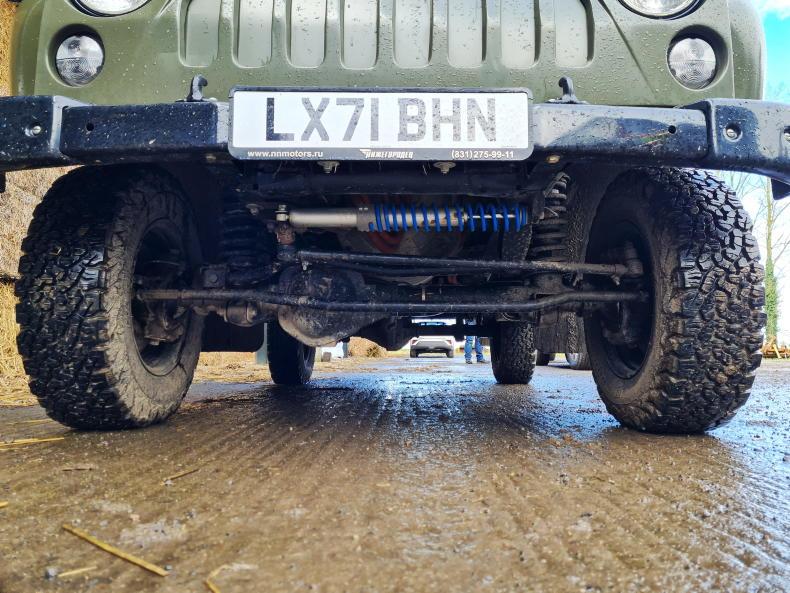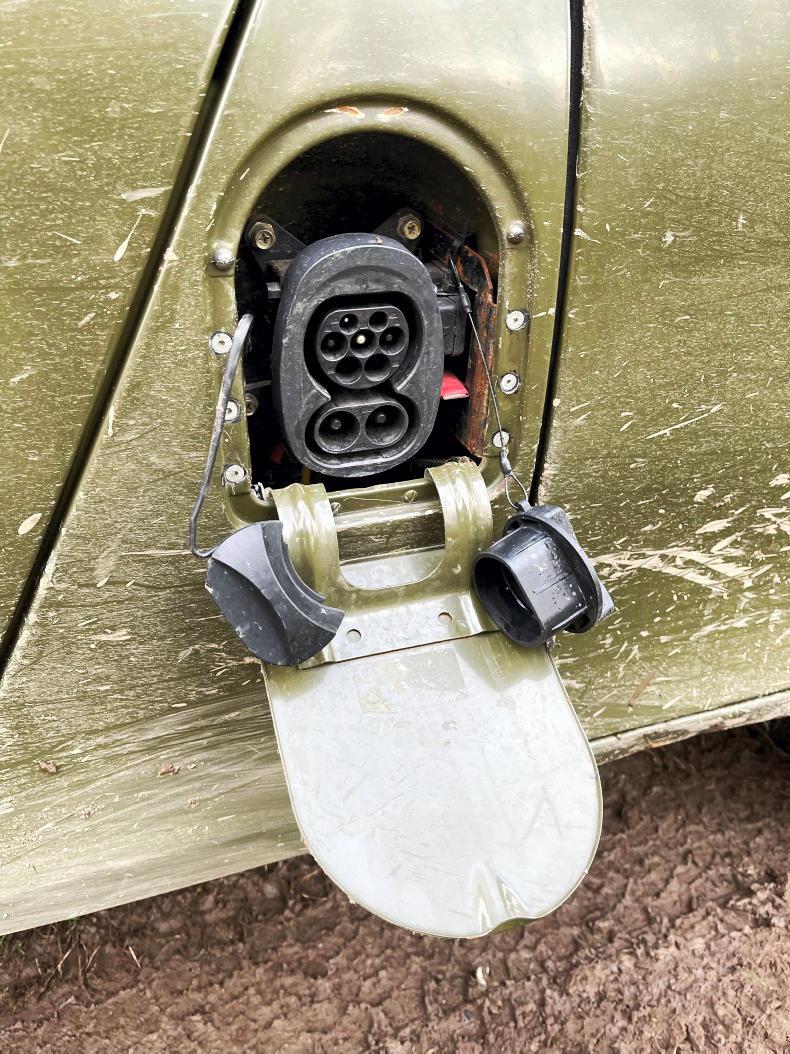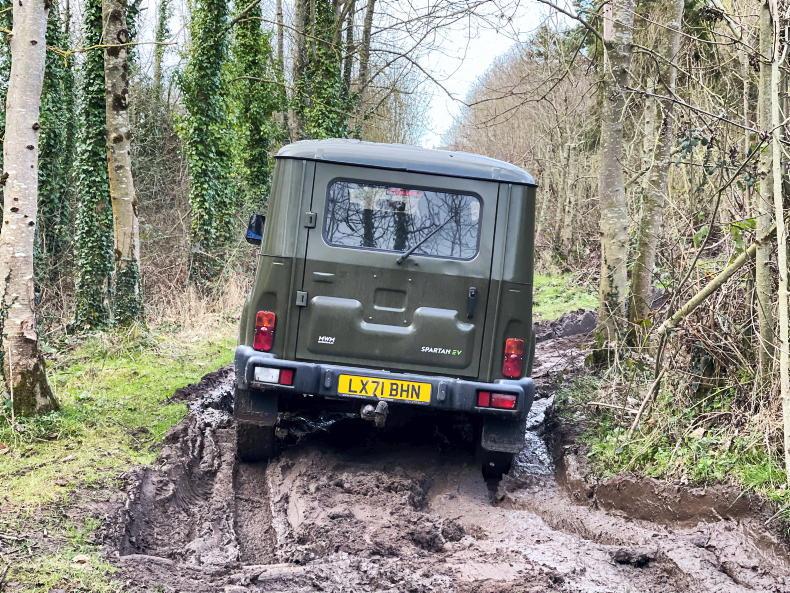Most of today’s 4x4 manufacturers have moved away from their roots of practicality and performance, instead glamourising offerings in favour of luxury and prestige.
However, one manufacturer going against the grain and back to the grass roots 4x4 offering nothing but performance and practicality is MWM (Maurice Ward Motors) with its Spartan EV.
That’s right, an all-electric 4x4 focused on being a work horse and not a show pony.
MWM is an Irish-owned, UK-based firm with an assembly facility in the Czech Republic.
The firm has been around for a number of years now and is no stranger to the Spartan, having previously imported it in its diesel form into the UK.

The front axle is fitted with coil springs while the rear axle is sprung on leaf springs.
The Spartan EV, like its diesel counterpart, is based on the Russian-built paramilitary UAZ Hunter 4x4 of the cold war era, before undergoing a factory right-hand drive and full EV conversion in the Czech Republic. The Spartan then has to undergo a number of upgrades to ensure it meets stringent UK and ROI road regulations.
With simplicity in mind, or so they say, the Spartan has no radio, central locking, padding and of course no air conditioning. They also say you should never judge a book by its cover so we got behind the wheel and put the Spartan EV through its paces off-road.
Motor
Under the hood, the Spartan EV has a 120kW (161bhp) motor which the manufacturer says produces a sizeable 600 Nm of torque. The 4x4 is powered by a 63-kWh lithium-ion battery pack and features a 2,500kg towing capacity.

The 120kW (161bhp) electric motor produces 600Nm of torque.
The unit features an energy recovery system for increased efficiency, in the line of regenerative braking. For those not familiar with the term, it essentially does what it says and harnesses the power when braking, capturing this kinetic energy and putting the power back to the batteries.
The main battery pack sits under the rear seats at the back of the jeep. Two additional smaller battery packs replaced the original fuel tanks on the sides of the vehicle. MWM explained that the batteries are stored in metal and waterproof packaging and that the whole vehicle is capable of wading to a depth of 1m.

The rear passenger doors have simple effective storage bins.
The motor is a water-cooled structure and the water jacket has an inlet and outlet pipe with a cooling flow of 8-10l/min.
Rosh Mendis, UK sales manager, said it takes nine to 10 hours to fully charge the vehicle, but 0-80% can be completed in as little at 30-40 minutes through rapid charging via its CCS2 charging port. Talking about charging times and range, Rosh noted that a 40-minute rapid charge cost him just €10 at a service station on the M9. Depending on how the vehicle is driven, Rosh said he found its range to be anywhere from 193-241km (120-150 miles) on a full charge.
Transmission
The Spartan features the equivalent of a three-speed transmission, with F/N/R selected through an electric rocker switch on the dash. The vehicle is part-time 4x4, with the drive sent to the rear wheels at all times and directed to the front via a two-range transfer box.

The spare tyre is located under the bonnet.
It’s shifted into 4x4 through a switch on the dash, while the vehicle is at a standstill. The drive line configuration includes 2WD high, 4WD high and 4WD low. We found that catching the right cog when moving through the transfer box sometimes required a bit of excessive force.
The unit has a maximum speed of up to 155km/h, but is limited at 130km/h, not that we would ever hit such speeds on Irish roads, especially with the lack of airbags leaving us more speed conscious.
Interior
Inside, the Spartan is very simple, yet functional – there are certainly no frills – but the manufacturer set out to take a practical and minimalist approach, which is what you get.

The rear bench type seats have a high mounting position due to the location of the battery.
The vinyl-clad seats appear rather basic but proved quite comfortable. The rear bench seat is in a high position due to the location of the battery directly underneath, which leaves passengers feeling as if they’re looking down at the driver and front passenger.

The 10in digital display and switch gear is positioned to the centre of the dash.
The floor is lined with what appears to be heavy-duty washable rubber mats from which two traditional gear sticks crudely appear. Instead of modern-day door cards, the Spartan has large velcro-covered storage bins within each of the rear doors that are simple and effective.
Chassis
The front axle is fitted with coil springs while the rear axle is sprung using leaf springs. The vehicle has a curb weight of 1,965kg, a payload capacity of 735kg, and a total gross weight of 2,700kg. The figure of interest to many is towing capacity, which is rated at 2,500kg.

The CCS2 charging point.
This is the first prototype built and Rosh explained that it has been successfully tested at pulling up to 5t, but such weights put an excessive drain on the battery.
For what appears to be a small compact 4x4, its poor steering lock left it feeling a little cumbersome when it came to cornering. The chassis isn’t galvanised, instead it’s treated with a zinc primer and topped up with a coat of either white, dark green, grey metallic or black metallic paint depending on customer preference.
MWM has packed lots of torque into the Spartan EV and, upon initial driving, we were hit with the impulse of power and responsiveness.
We found the transmission to be straightforward and practical, though catching the right cog when moving through the transfer box sometimes required persuasion.

Although basic looking, the seats do provide a good level of comfort.
Having challenged its abilities through difficult terrain, its traction capabilities surpassed our expectations.
Modern vehicles and even the majority of basic modern tractors offer a certain level of luxury.
The manufacturer chased simplicity, but we felt the lack of refinement was a bit of a disappointment, considering its not so budget price tag of €39,900 plus VAT.

The MWM Spartan EV surprised us with its off-road capabilities.
However, for the enthusiast chasing a practical, more environmentally friendly 4x4 that isn’t bothered by the lack of luxury and refinement, then for sure the Spartan EV is an option worth exploring.
We see the Spartan EV well suited to niche markets such as wildlife parks that require a practical 4x4, yet are climate and carbon conscious.
Battery: 63-kWh lithium-ion pack.
Motor: 120kW (161bhp) and 600Nm torque.
Transmission: three-speed manual with two-range transfer box.
Top speed: 130 km/h.
Range: 193-241km (120-150 miles).
Wading depth: 1m.
Payload: 735kg.
Curb weight: 1,965kg.
Towing capacity: 2,500kg.
Radio: No.
Electric windows: No.
Air conditioning: No.
Price: €39,900 plus VAT.
Most of today’s 4x4 manufacturers have moved away from their roots of practicality and performance, instead glamourising offerings in favour of luxury and prestige.
However, one manufacturer going against the grain and back to the grass roots 4x4 offering nothing but performance and practicality is MWM (Maurice Ward Motors) with its Spartan EV.
That’s right, an all-electric 4x4 focused on being a work horse and not a show pony.
MWM is an Irish-owned, UK-based firm with an assembly facility in the Czech Republic.
The firm has been around for a number of years now and is no stranger to the Spartan, having previously imported it in its diesel form into the UK.

The front axle is fitted with coil springs while the rear axle is sprung on leaf springs.
The Spartan EV, like its diesel counterpart, is based on the Russian-built paramilitary UAZ Hunter 4x4 of the cold war era, before undergoing a factory right-hand drive and full EV conversion in the Czech Republic. The Spartan then has to undergo a number of upgrades to ensure it meets stringent UK and ROI road regulations.
With simplicity in mind, or so they say, the Spartan has no radio, central locking, padding and of course no air conditioning. They also say you should never judge a book by its cover so we got behind the wheel and put the Spartan EV through its paces off-road.
Motor
Under the hood, the Spartan EV has a 120kW (161bhp) motor which the manufacturer says produces a sizeable 600 Nm of torque. The 4x4 is powered by a 63-kWh lithium-ion battery pack and features a 2,500kg towing capacity.

The 120kW (161bhp) electric motor produces 600Nm of torque.
The unit features an energy recovery system for increased efficiency, in the line of regenerative braking. For those not familiar with the term, it essentially does what it says and harnesses the power when braking, capturing this kinetic energy and putting the power back to the batteries.
The main battery pack sits under the rear seats at the back of the jeep. Two additional smaller battery packs replaced the original fuel tanks on the sides of the vehicle. MWM explained that the batteries are stored in metal and waterproof packaging and that the whole vehicle is capable of wading to a depth of 1m.

The rear passenger doors have simple effective storage bins.
The motor is a water-cooled structure and the water jacket has an inlet and outlet pipe with a cooling flow of 8-10l/min.
Rosh Mendis, UK sales manager, said it takes nine to 10 hours to fully charge the vehicle, but 0-80% can be completed in as little at 30-40 minutes through rapid charging via its CCS2 charging port. Talking about charging times and range, Rosh noted that a 40-minute rapid charge cost him just €10 at a service station on the M9. Depending on how the vehicle is driven, Rosh said he found its range to be anywhere from 193-241km (120-150 miles) on a full charge.
Transmission
The Spartan features the equivalent of a three-speed transmission, with F/N/R selected through an electric rocker switch on the dash. The vehicle is part-time 4x4, with the drive sent to the rear wheels at all times and directed to the front via a two-range transfer box.

The spare tyre is located under the bonnet.
It’s shifted into 4x4 through a switch on the dash, while the vehicle is at a standstill. The drive line configuration includes 2WD high, 4WD high and 4WD low. We found that catching the right cog when moving through the transfer box sometimes required a bit of excessive force.
The unit has a maximum speed of up to 155km/h, but is limited at 130km/h, not that we would ever hit such speeds on Irish roads, especially with the lack of airbags leaving us more speed conscious.
Interior
Inside, the Spartan is very simple, yet functional – there are certainly no frills – but the manufacturer set out to take a practical and minimalist approach, which is what you get.

The rear bench type seats have a high mounting position due to the location of the battery.
The vinyl-clad seats appear rather basic but proved quite comfortable. The rear bench seat is in a high position due to the location of the battery directly underneath, which leaves passengers feeling as if they’re looking down at the driver and front passenger.

The 10in digital display and switch gear is positioned to the centre of the dash.
The floor is lined with what appears to be heavy-duty washable rubber mats from which two traditional gear sticks crudely appear. Instead of modern-day door cards, the Spartan has large velcro-covered storage bins within each of the rear doors that are simple and effective.
Chassis
The front axle is fitted with coil springs while the rear axle is sprung using leaf springs. The vehicle has a curb weight of 1,965kg, a payload capacity of 735kg, and a total gross weight of 2,700kg. The figure of interest to many is towing capacity, which is rated at 2,500kg.

The CCS2 charging point.
This is the first prototype built and Rosh explained that it has been successfully tested at pulling up to 5t, but such weights put an excessive drain on the battery.
For what appears to be a small compact 4x4, its poor steering lock left it feeling a little cumbersome when it came to cornering. The chassis isn’t galvanised, instead it’s treated with a zinc primer and topped up with a coat of either white, dark green, grey metallic or black metallic paint depending on customer preference.
MWM has packed lots of torque into the Spartan EV and, upon initial driving, we were hit with the impulse of power and responsiveness.
We found the transmission to be straightforward and practical, though catching the right cog when moving through the transfer box sometimes required persuasion.

Although basic looking, the seats do provide a good level of comfort.
Having challenged its abilities through difficult terrain, its traction capabilities surpassed our expectations.
Modern vehicles and even the majority of basic modern tractors offer a certain level of luxury.
The manufacturer chased simplicity, but we felt the lack of refinement was a bit of a disappointment, considering its not so budget price tag of €39,900 plus VAT.

The MWM Spartan EV surprised us with its off-road capabilities.
However, for the enthusiast chasing a practical, more environmentally friendly 4x4 that isn’t bothered by the lack of luxury and refinement, then for sure the Spartan EV is an option worth exploring.
We see the Spartan EV well suited to niche markets such as wildlife parks that require a practical 4x4, yet are climate and carbon conscious.
Battery: 63-kWh lithium-ion pack.
Motor: 120kW (161bhp) and 600Nm torque.
Transmission: three-speed manual with two-range transfer box.
Top speed: 130 km/h.
Range: 193-241km (120-150 miles).
Wading depth: 1m.
Payload: 735kg.
Curb weight: 1,965kg.
Towing capacity: 2,500kg.
Radio: No.
Electric windows: No.
Air conditioning: No.
Price: €39,900 plus VAT.















 This is a subscriber-only article
This is a subscriber-only article









SHARING OPTIONS: